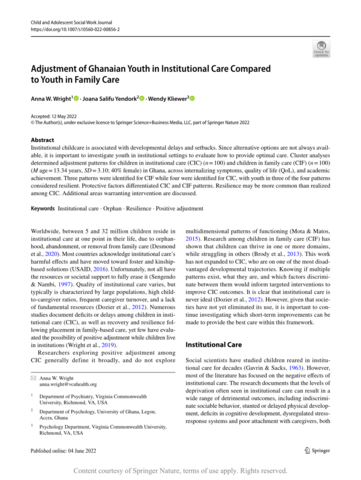Institutional childcare is associated with developmental delays and setbacks. Since alternative options are not always available, it is important to investigate youth in institutional settings to evaluate how to provide optimal care. Cluster analyses determined adjustment patterns for children in institutional care (CIC) (n = 100) and children in family care (CIF) (n = 100) (M age = 13.34 years, SD = 3.10; 40% female) in Ghana, across internalizing symptoms, quality of life (QoL), and academic achievement.
Three patterns were identified for CIF while four were identified for CIC, with youth in three of the four patterns considered resilient. Protective factors differentiated CIC and CIF patterns. Resilience may be more common than realized among CIC. Additional areas warranting intervention are discussed.

